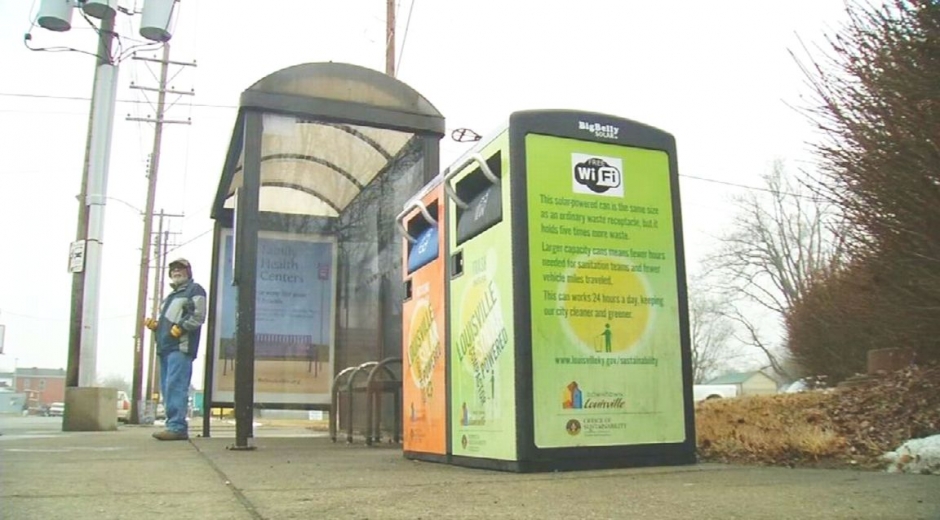
Louisville Adds Wi-Fi To Garbage Cans

Thomas McAdam
iLocalNews Louisville is your best source of news and information about Derby City.
- Professional Journalist
It’s impossible to make up stories like this. Standing in Louisville’s Russell neighborhood last Wednesday, Mayor Greg Fischer announced the launch of Phase 2 of the West Louisville Neighborhood Wi-Fi Project, which uses innovative technology to provide free Internet to citizens.
Two Big Belly trash and recycling units (garbage cans) in Russell have been transformed into 4G Wi-Fi hot spots units, the first Big Belly 4G hot spot units in the world. And, since it is the Fisher administration’s stated policy to work toward saving the planet, they are solar powered.
“For Louisville to successfully transition to a high-tech and advanced manufacturing economy, every one in every neighborhood must have access to the Internet,” said Fischer. “Today’s announcement is one step toward getting our entire city wired into the 21st Century economy.”
The Big Belly 4G hot spot units are located at TARC stops on Market Street at 25th and 28th streets; hardly centers of Louisville’s 21st Century economy. In fact, the Russell neighborhood is one of our city’s most depressed economic and racial ghettos.
“Wi-Fi at bus stops benefits the growing number of TARC passengers using our mobile website to plan their trips and find out when their bus will arrive. Metro’s partnership with TARC makes catching a bus at these stops an easier and more convenient option - as simple as tapping into the Wi-Fi and visiting www.ridetarc.org,” said TARC Executive J. Barry Barker.
The Big Belly Wi-Fi hot spots have a maximum range of 100 feet, and, because they are solar powered, operate only between 8 a.m. and 6 p.m. Bus riders needing to travel after dark will have to “plan their trips” the old-fashioned way.
“These new hot spots expand the scope of the West Louisville Wi-Fi Project. We will look for additional opportunities to install access points in key locations to ultimately create a network,” said Ted Smith, chief of Civic Innovation for Louisville Metro Government. “Our biggest lesson was that this network can only be as fast as the fiber in the ground, so we will continue to work on that front as well.”
Mayor Fischer set up his Louisville Metro Government’s Innovation Team last year, as a sort of “think tank” to come up with ideas for things like “sustainability” and environmental protection. Thus far, in addition to the Wi-Fi garbage cans, the clever folks over at LMGIT have suggested that it would be nice if Louisville planted more trees.
Ted Smith, who is chief of Civic Innovation for Louisville Metro Government, and is paid $117,567 per year, remarked, “We have the issue of how do we get everyone to a level playing field. This is a place that has a rich past and an exciting future. So if you want to use the only municipal wireless network in Louisville, Kentucky, you’ll be coming to Russell.”
We are unsure of how much of Mr. Smith’s time is actually spent in the Russell neighborhood, but we are encouraged by the fact that he sees “an exciting future” for the first area of Louisville to boast electronic garbage cans.

Big Bellies are called that, because they hold five times the trash of conventional bins. “Smart sensors” notify the city when the station is getting full so that collections are done only on an as needed basis, reducing waste collection costs. According to the folks at Big Belly, additional environmental and social benefits include reduced truck traffic and cleaner streets.
Mayor Fischer has not revealed the cost to taxpayers for these 21st Century marvels. Other cities using the Bib Belly garbage cans report paying a weekly lease payment of $60 per can. That’s Sixty Dollars, per week, per garbage can.
Ms. Ashlee Callahan, a west Louisville resident, was quoted by WDRB Television as remarking, “The technology is just growing. It's crazy they can put it in a trash can.”
We are compelled to agree with Ms. Callahan. It’s crazy.